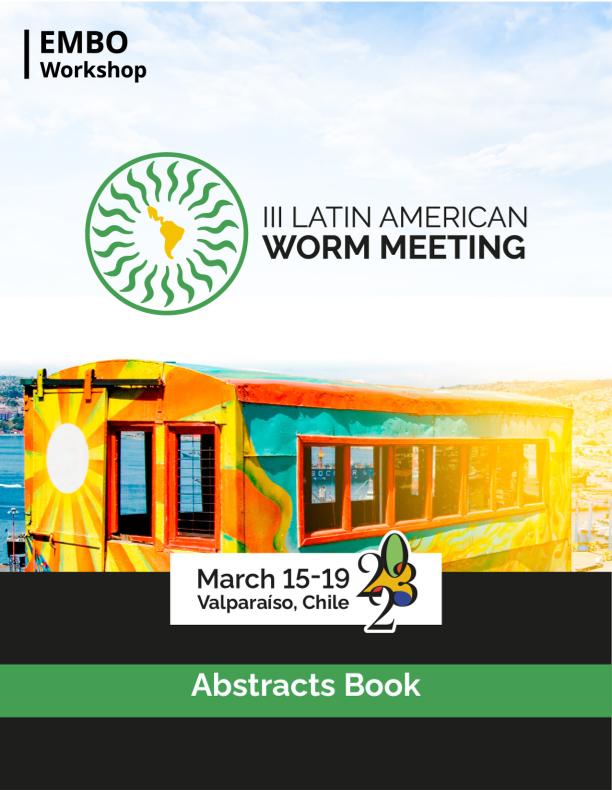Mostrar el registro sencillo del ítem
dc.contributor.author
Blanco, Maria Gabriela

dc.contributor.author
Florman, Jeremy
dc.contributor.author
Alkema, Mark
dc.contributor.author
de Rosa, Maria Jose

dc.contributor.author
Rayes, Diego Hernán

dc.date.available
2024-03-04T09:32:14Z
dc.date.issued
2023
dc.identifier.citation
Behavioral state transitions in C. elegans; III Latin American Worm Meeting; Valaparaíso; Chile; 2023; 26-26
dc.identifier.uri
http://hdl.handle.net/11336/229146
dc.description.abstract
Changes in food seeking behaviors are influenced by physiological internal states. During foraging, animals can switch from one state to another, for example, from satiety while feeding to hunger and stress when there is food shortage. Referred to as the “happiness hormone”, serotonin has been related in many animals to modulate feeding in favorable environmental conditions. On the other hand, noradrenaline is the major conserved neurotransmitter implicated in triggering a stress response. In this work, we are interested in how these neurotransmitters interact to modulate the animal`s internal state in behavioral transitions. The complexity of the mammalian brain complicates the study of neuronal processes. The nematode Caenorhabditis elegans is suitable for understanding neuronal signaling because of its simple and well-described nervous system. During a prolonged fasting period, animals decrease their locomotion. We demonstrate that locomotion can be resumed by adding tyramine, the analog of noradrenaline in invertebrates. Interestingly, serotonin produces the opposite effect by reducing locomotion. These results suggest that serotonin acts antagonistically to tyramine. Also, when the environment improves and fasted animals encounter food, they release serotonin to slow their locomotion and promote feeding. We found that this slowing response and the activity of the serotonergic neurons upon food encounter are enhanced in tyramine-deficient mutants. Given that tyramine levels decrease during fasting, we hypothesize that the lack of tyramine upon fasting disinhibits the serotonergic neurons and favors their activity upon refeeding. Considering the conservation of neuronal components, we believe that our results may contribute to the understanding of the nervous control of state dependent foraging strategies
dc.format
application/pdf
dc.language.iso
eng
dc.publisher
Universidad de Valparaíso
dc.rights
info:eu-repo/semantics/openAccess
dc.rights.uri
https://creativecommons.org/licenses/by-nc-sa/2.5/ar/
dc.subject
Modulación Neuronal
dc.subject
C. elegans
dc.subject
serotonina
dc.subject
tiramina
dc.subject.classification
Bioquímica y Biología Molecular

dc.subject.classification
Ciencias Biológicas

dc.subject.classification
CIENCIAS NATURALES Y EXACTAS

dc.title
Behavioral state transitions in C. elegans
dc.type
info:eu-repo/semantics/publishedVersion
dc.type
info:eu-repo/semantics/conferenceObject
dc.type
info:ar-repo/semantics/documento de conferencia
dc.date.updated
2024-02-22T14:22:20Z
dc.journal.pagination
26-26
dc.journal.pais
Chile

dc.journal.ciudad
Valparaíso
dc.description.fil
Fil: Blanco, Maria Gabriela. Consejo Nacional de Investigaciones Científicas y Técnicas. Centro Científico Tecnológico Conicet - Bahía Blanca. Instituto de Investigaciones Bioquímicas de Bahía Blanca. Universidad Nacional del Sur. Instituto de Investigaciones Bioquímicas de Bahía Blanca; Argentina
dc.description.fil
Fil: Florman, Jeremy. University Of Massachussets. Medical School. Department Of Neurobiology; Estados Unidos
dc.description.fil
Fil: Alkema, Mark. University Of Massachussets. Medical School. Department Of Neurobiology; Estados Unidos
dc.description.fil
Fil: de Rosa, Maria Jose. Consejo Nacional de Investigaciones Científicas y Técnicas. Centro Científico Tecnológico Conicet - Bahía Blanca. Instituto de Investigaciones Bioquímicas de Bahía Blanca. Universidad Nacional del Sur. Instituto de Investigaciones Bioquímicas de Bahía Blanca; Argentina
dc.description.fil
Fil: Rayes, Diego Hernán. Consejo Nacional de Investigaciones Científicas y Técnicas. Centro Científico Tecnológico Conicet - Bahía Blanca. Instituto de Investigaciones Bioquímicas de Bahía Blanca. Universidad Nacional del Sur. Instituto de Investigaciones Bioquímicas de Bahía Blanca; Argentina
dc.relation.alternativeid
info:eu-repo/semantics/altIdentifier/url/https://cinv.uv.cl/en/3rd-la-worm-meeting/
dc.conicet.rol
Autor

dc.conicet.rol
Autor

dc.conicet.rol
Autor

dc.conicet.rol
Autor

dc.conicet.rol
Autor

dc.coverage
Internacional
dc.type.subtype
Reunión
dc.description.nombreEvento
III Latin American Worm Meeting
dc.date.evento
2023-03-15
dc.description.ciudadEvento
Valaparaíso
dc.description.paisEvento
Chile

dc.type.publicacion
Book
dc.description.institucionOrganizadora
Universidad de Valparaíso
dc.description.institucionOrganizadora
Centro Interdisciplinario De Neurociencia De Valparaíso
dc.source.libro
III Latin American Worm Meeting
dc.date.eventoHasta
2023-03-16
dc.type
Reunión
Archivos asociados
